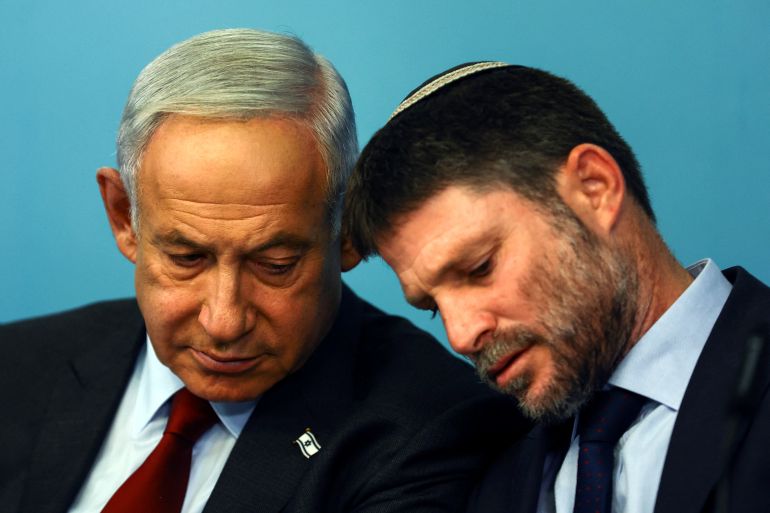Israel to ramp up settlement expansion in occupied West Bank
The finance minister was granted sweeping powers to expedite construction, bypassing measures in place for 27 years.

Israel’s hardline coalition government has approved plans for thousands of new housing units in the occupied West Bank and given the far-right finance minister sweeping powers to expedite the construction of illegal settlements, bypassing measures that have been in place for 27 years.
On Sunday, Prime Minister Benjamin Netanyahu ratified the move in the cabinet, allowing pro-settler Finance Minister Bezalel Smotrich to bypass the six-stage process for building settlements, which are considered illegal under international law, said Al Jazeera’s Imran Khan in West Jerusalem.
Keep reading
list of 4 itemsUN Security Council voices ‘dismay’ over Israeli settlements
US says it is ‘extremely troubled’ by new Israeli settlements law
How problematic are illegal Israeli settlements in the West Bank?
The deal between Netanyahu and Smotrich was on the cards for a while, Khan said, adding that it enables the finance minister to “effectively take over the entire illegal settlement-building process”.
Smotrich said: “We will continue to develop the settlement project and strengthen Israeli control of the territory.”
The plans for the approval of 4,560 housing units in various areas of the West Bank were included on the agenda of Israel’s Supreme Planning Council that meets next week.
Various factions expressed deep concerns that the entire West Bank could soon come under Israeli control.
To approve settlement activity is a “dangerous escalation to complete the annexation of the West Bank”, the Palestinian foreign ministry said.
Hamas, which has ruled Gaza since 2007, said the move would only escalate tensions in the region, while Fatah warned that “the settlers will be removed from the West Bank as they were removed from the Gaza Strip”.
The Palestinian Authority said it would boycott a meeting of the Joint Economic Committee with Israel scheduled for Monday.
‘Deeply troubled’
Israel’s hardline government – which includes ultra-Orthodox parties and a far-right ultranationalist religious faction – had put settlement expansion in the occupied West Bank at the top of its priorities.
Netanyahu’s Likud Party pledged to “advance and develop settlement in all parts of the land of Israel – in the Galilee, Negev, Golan Heights, and Judea and Samaria” – the Biblical names for the occupied West Bank.
The new push puts Israel on a collision course with its closest allies, including the United States, which said it was “deeply troubled” by the settlement expansion plan and the reports of changes to the processes for planning and approval of settlements.
“The United States opposes such unilateral actions that make a two-state solution more difficult to achieve and are an obstacle to peace,” State Department spokesperson Matthew Miller said in a statement on Sunday. “We call on the Government of Israel to fulfill the commitments it made in Aqaba, Jordan and Sharm El Sheikh, Egypt and return to dialogue aimed at de-escalation.”
Earlier, illegal settlements in the occupied West Bank came under Israeli military control. There were six phases in the construction process that were overseen by the Coordination of Government Activities in the Territories (COGAT), the Israeli military’s civil body that administers the West Bank. Objections could be made at any of the stages by the international community or even by Israelis.
Smotrich “now has the final and first say over what settlements can be built”, said Khan.
Given that a lot of Smotrich’s support is from people who live in the settlements, “he’s unlikely to say no to any kind of expansion”, Khan added.
Since taking office in January, Netanyahu’s coalition has approved 7,000 new housing units, many in the occupied West Bank. The government also amended a law to clear the way for settlers to return to four settlements that had previously been evacuated.
Nearly 750,000 Israelis live in 250 illegal settlements in the occupied West Bank, built on land captured by Israel in the 1967 Six-Day War.